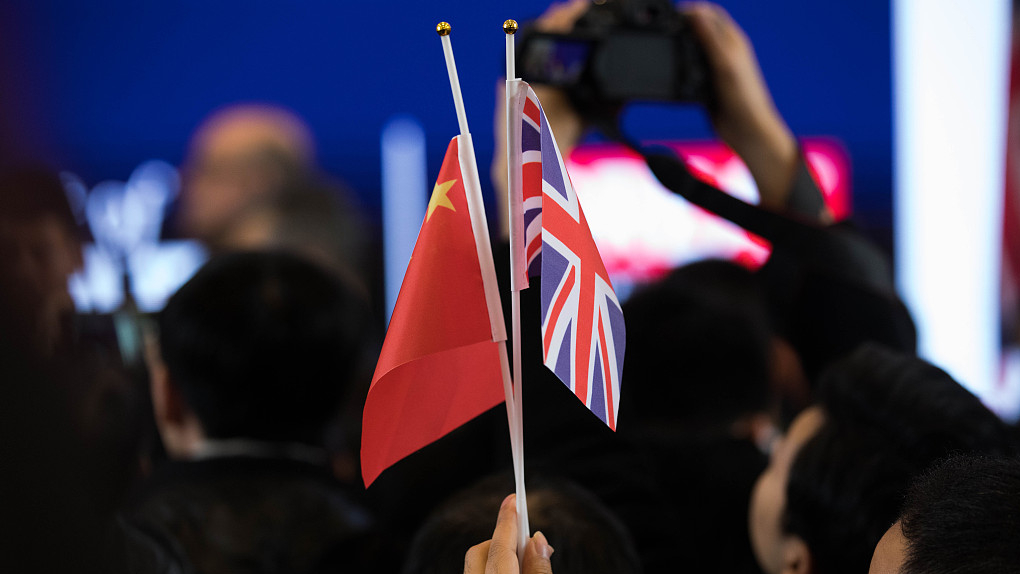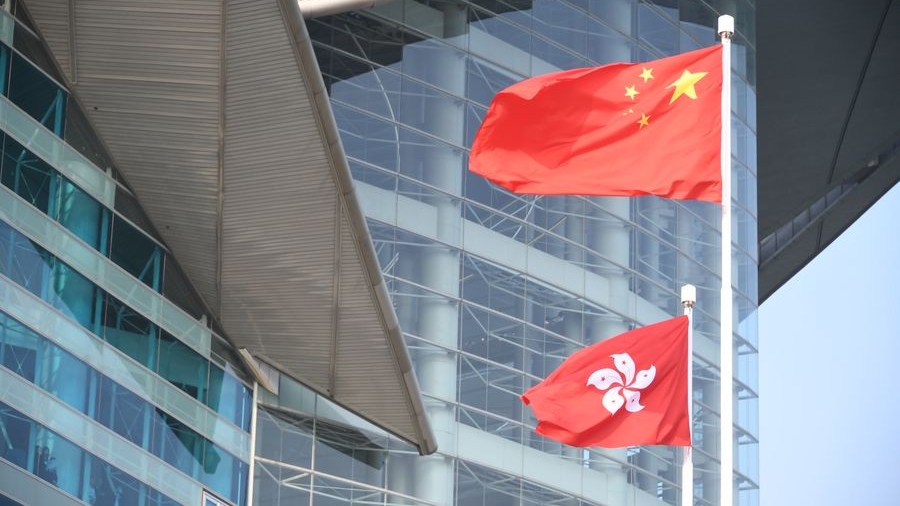
The flags of China and the United Kingdom. /CGTN
The flags of China and the United Kingdom. /CGTN
Editor's Note: Ken Moak, who taught economic theory, public policy and globalization at university level for 33 years, co-authored a book entitled "China's Economic Rise and Its Global Impact" in 2015. The article reflects the author's opinion, and not necessarily the views of CGTN.
When a Western reporter asked a young protester why they were carrying British colonial and U.S. flags, his response was – "We have democracy in Hong Kong". However, they did not recognize that the region enjoyed more freedom now than under the British colonial rule.
For example, the Chinese government allowed activists to protest to rescind policies that they did not like or felt were infringing on their "freedom." A 2012 education curriculum reform proposal of focusing on Chinese history and culture brought out thousands opposing it as "brainwashing education." The government listened and withdrew the proposal, demonstrating that democracy was alive and well in Hong Kong.
In fact, the protesters were living proof that they enjoyed "absolute" freedom of speech and expression – protesting with violent acts without repercussions. In the 2014 "umbrella movement" and 2019 "extradition legislation" protests, the government did not fire on protesters who destroyed properties, attacked people who opposed their views and also police.
The British government, on the other hand, would have used force against the protesters, as it has done in the past. For example, in 1922 the British colonial government introduced and passed the Emergency Regulations Ordinance (within one day), giving the government power to arrest, kill, seize property, censor and rolled out other illiberal measures to suppress the Chinese seamen's strike for higher wages in which some were killed by British forces.
The colonial government invoked the law again in the 1967 to smash a "leftist" protest which began as a labor strike but later turned against British colonial authoritarian rule. The colonial government responded by making numerous arrests, banned "left-leaning" publications and closed "left-wing" schools. A curfew was also imposed, detaining or even shooting people.
Even today, the UK government would probably use force to stop violence. UK Prime Minister Boris Johnson was reportedly vowing to "bring the full force of the government" against protesters damaging properties and hurting people.
Worse, the UK was not only hypocritical, but had deliberately incubated what happened in Hong Kong today. The government revised the colony's education system long before it was to be returned to China, focusing on British history, culture and ideals and discouraged students from studying those relating to China.
The "Anglo-centric" education culminated in creating a generation of Hong Kongers knowing nothing about their ancestral country, some even believing themselves superior to their Chinese mainland cousins.

The Chinese national flag and the flag of the HKSAR. /Xinhua
The Chinese national flag and the flag of the HKSAR. /Xinhua
It was probably the delusion of superiority that caused many Hong Kongers to resent and oppose Chinese rule, feeling it is beneath them to be governed by the Chinese mainlanders.
The last colonial governor, Chris Patten, was planting a "political time bomb" on Hong Kong, fermenting "democratic" parties, the very institutions that the British government denied in its Hong Kong subjects. Patten's "work" resulted in the formation of all "pan-democratic" parties by prominent pro-British citizens.
Once elected to the Legco, Hong Kong's legislature body, the "pan-democratic" parties opposed all policies that the government proposed, causing a dysfunctional government and exacerbating issues such as housing.
For example, the "pan-democrats" opposed the government's proposal to reclaim land from the sea to build social housing, culminating in creating a political and social crisis.
It could also be argued that the UK might be reluctant in returning Hong Kong to China. The colony was a "cash cow" in that the British government took away the local population's land and leased back to them, creating an endless source of revenue. British and Hong Kong Chinese-owned companies, too, were lobbying the UK to maintain the "status quo" of colonial status so that they could continue to profit, thus explaining why the then Prime Minister Margaret Thatcher pressed Deng Xiaoping to honor the Opium Wars-era unequal treaties.
The UK even repatriated Hong Kong's 10 U.S. billion dollars of foreign reserves by building a new airport on Lantau Island with the stipulation that only British enterprises could bid on the project. In this sense, it might not be a surprise if the UK wanted to "bankrupt" the city, making it harder for China to govern.
In short, the UK does not hold the "moral high ground", considering its authoritarian colonial legacy and hypocritical policies on Hong Kong. Indeed, the "Anglo-centric" education curriculum and Patten's "democracy" push could be interpreted as a disguise for the region's future political unrest, therefore responsible for Hong Kong's chaos.
(If you want to contribute and have specific expertise, please contact us at opinions@cgtn.com.)